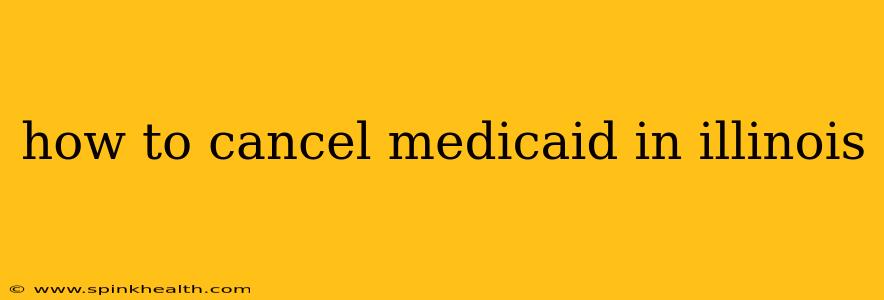How to Cancel Medicaid in Illinois: A Step-by-Step Guide
Navigating the process of canceling your Illinois Medicaid coverage can feel daunting, but it doesn't have to be. This guide walks you through the steps, addressing common questions and concerns along the way. Think of it as your personal roadmap to successfully managing your healthcare coverage.
Imagine this: You've landed a new job with excellent health insurance benefits. Or perhaps your circumstances have changed significantly, and you no longer qualify for Medicaid. Whatever the reason, understanding how to cancel your coverage is crucial. Let's explore the process.
How do I cancel my Medicaid in Illinois?
The simplest and most effective way to cancel your Illinois Medicaid is to contact the Illinois Department of Healthcare and Family Services (HFS) directly. You can do this via phone, mail, or online portal (if available). Their contact information is readily accessible on their official website. This direct approach ensures your cancellation is processed correctly and efficiently. Don't rely on informal methods; contacting HFS directly is the safest route.
What if I don't want Medicaid anymore?
This is a perfectly valid reason to cancel your coverage. Life changes, and your healthcare needs may evolve. Perhaps you secured private insurance through employment or a spouse's plan. Regardless of your reason, contacting HFS is the key to formally ending your Medicaid enrollment. They will guide you through the process and answer any questions you may have.
How long does it take to cancel Medicaid in Illinois?
The processing time varies, but it's generally advisable to initiate the cancellation process well in advance of when you need the coverage to end. Allow ample time for the paperwork to be processed and confirmed. Contacting HFS directly will provide the most accurate timeframe for your specific situation. Procrastination can create unnecessary complications.
What happens after I cancel my Medicaid?
Once your cancellation is processed, your Medicaid coverage will officially end on a specific date, which will be communicated to you by HFS. It's essential to confirm the date and ensure you have a replacement insurance plan in place to avoid any gaps in coverage. This is especially important if you anticipate needing medical care shortly after cancellation. Consider making any necessary appointments before your coverage lapses.
What are the consequences of canceling Medicaid?
The primary consequence is the loss of your Medicaid coverage. This means you will no longer be eligible for the financial assistance with healthcare costs provided by the program. You will be responsible for paying for all your medical expenses out-of-pocket. Make sure you thoroughly understand the financial implications before canceling your coverage.
Can I reinstate my Medicaid coverage later?
Yes, you can reapply for Medicaid if your circumstances change and you meet the eligibility requirements again. The process is similar to the initial application, and you'll need to provide updated information about your income, household size, and other relevant factors. Keep in mind that approval is not guaranteed and depends on your current circumstances.
I moved out of Illinois, do I need to cancel my Medicaid?
If you move out of Illinois, your Medicaid coverage will likely not be valid in your new state of residence. You should promptly notify HFS of your change of address and inquire about the transferability of your coverage or the process for obtaining Medicaid in your new state. Each state has its own guidelines and procedures.
Successfully canceling your Illinois Medicaid requires proactive communication with the HFS. This step-by-step guide offers clarity and direction, helping you confidently manage your healthcare coverage. Remember, planning and direct communication are key to a smooth transition.

